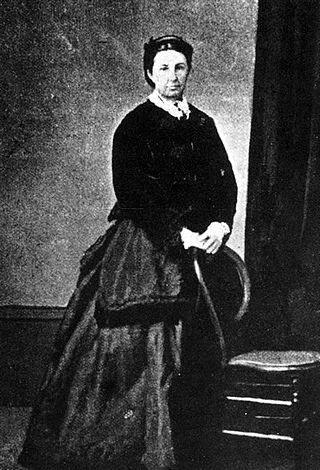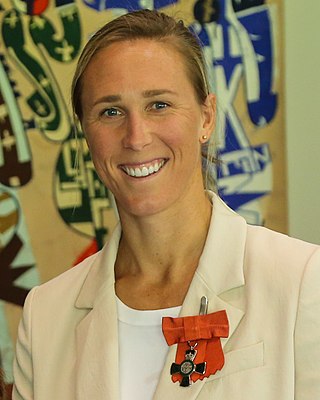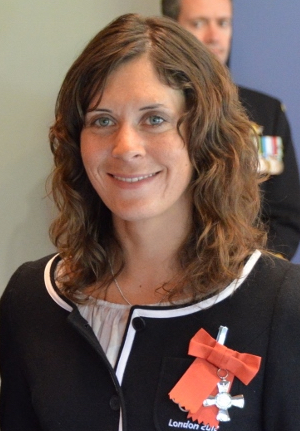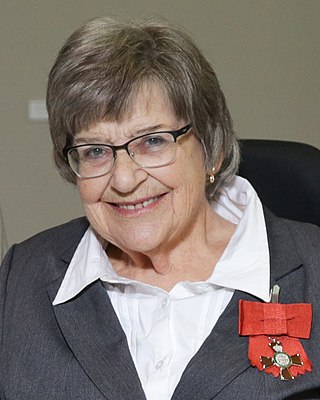
Amanda Jane "Minnie" Baragwanath MNZM is a disability advocate from New Zealand. [1] In 2011, she founded Be. Accessible, a social enterprise which aims to make New Zealand accessible and inclusive for all people with disabilities. [2] [3]

Amanda Jane "Minnie" Baragwanath MNZM is a disability advocate from New Zealand. [1] In 2011, she founded Be. Accessible, a social enterprise which aims to make New Zealand accessible and inclusive for all people with disabilities. [2] [3]
Baragwanath grew up in Palmerston North. [4] When she was 14 years old, she was diagnosed with Stargardt disease, an incurable disease of the eyes which caused her to lose her sight. [2] Baragwanath studied at Massey University and completed a bachelor's degree in English literature, a bachelor of communication studies and a graduate diploma in economic development. [2]
In 2011, Baragwanath founded Be. Accessible, and Be. Leadership as a subproject. Be. Leadership focused on providing leadership development programmes for disabled New Zealanders. [5] In 2019 she renamed the organisation Be. Lab and established the Centre of Possibility at Auckland University of Technology (AUT). [6] At the Centre of Possibility Baragwanath works with AUT researchers and academics in the field of possibility design and innovation. [6]
In 2013, Baragwanath received the Sir Peter Blake Leadership Award and in 2014 she was made a member of the New Zealand Order of Merit. [2] [7] In 2017 she received the New Zealand Women of Influence Award for Diversity. [8] In 2019 she was named by Zonta International as one of 100 Women of Achievement in New Zealand for her leadership and advocacy for social change. [4]

Williamina Dean was a New Zealander who was found guilty of infanticide and hanged. She was the only woman to be executed in New Zealand. Several other women were sentenced to death, but all of them had their sentences commuted to either life or long-duration imprisonment.

Paula Margaret Tesoriero is a former New Zealand paralympics racing cyclist and senior public servant.

Cameron Leslie is a New Zealand paralympics swimmer and wheelchair rugby player.
Baragwanath is a Cornish language surname originating in west Cornwall in the UK. As a result of emigration, members of the Baragwanath family can now be found in South Africa, the UK and Ireland, Australia, the US, and New Zealand. In Johannesburg, Gauteng, there is a hospital whose name is derived from a local storekeeper, John Albert Baragwanath: the Chris Hani Baragwanath Academic Hospital, Soweto. This hospital has over 3,000 beds.

Emma Kimberley Twigg is a New Zealand rower. A single sculler, she was the 2014 world champion and won gold in her fourth Olympics in Tokyo in July 2021. Previous Olympic appearances were in 2008, 2012, and 2016. She has retired from rowing twice, first for master-level studies in Europe in 2015 and then after the 2016 Olympics, disappointed at having narrowly missed an Olympic medal for the second time. After two years off the water, she started training again in 2018 and won silver at the 2019 World Rowing Championships. Since her marriage in 2020, she has become an outspoken advocate for LGBT athletes. At the 2020 Summer Olympics, Twigg won gold in the woman's single scull. At the 2024 Summer Olympics, Twigg won Silver in the same event.

Joanna Ayela Aleh is a New Zealand sailor. She is a national champion, a former world champion, and an Olympic gold medallist.

Women in New Zealand are women who live in or are from New Zealand. Notably New Zealand was the first self-governing country in the world where women were entitled to vote. In recent times New Zealand has had many women in top leadership and government roles, including three female Prime Ministers, most recently Jacinda Ardern.

Michelle Emma Dickinson, also known as Nanogirl, is a nanotechnologist and science educator based in New Zealand.

Victoria Metcalf is an Antarctic researcher based in New Zealand, best known for her work on Antarctic fishes and invertebrates. She was awarded the 2006 Zonta Science Award.

Wendy Alison Nelson is a New Zealand marine scientist and world expert in phycology. She is New Zealand's leading authority on seaweeds. Nelson is particularly interested in the biosystematics of seaweeds/macroalgae of New Zealand, with research on floristics, evolution and phylogeny, as well as ecology, and life history studies of marine algae. Recently she has worked on the systematics and biology of red algae including coralline algae, distribution and diversity of seaweeds in harbours and soft sediment habitats, and seaweeds of the Ross Sea and Balleny Islands.
Carole Marie Shepheard is a New Zealand artist. She specialises in printmaking and her work is held in national and international collections including the Museum of New Zealand Te Papa Tongarewa and the Auckland Art Gallery Toi o Tāmaki.

Sarah Trotman is a businesswoman, director, celebrant and community advocate from Auckland, New Zealand. She has been a member of the Waitematā Local Board of Auckland Council since 2019.

Sarah Houbolt is an Australian Paralympic swimmer and a physical theatre performer. She is a strong advocate for disability rights and the arts.

Rebecca Louise Keoghan is a New Zealand dairy farmer and professional company director.
Gillian Brooker Greer, also known as Gillian Boddy, is a New Zealand teacher, a literary scholar specialising in the works of Katherine Mansfield, a heath advocate, an advisor to the New Zealand Government and has been an administrator of numerous non profit organisations. She was the chief executive of the National Council of Women of New Zealand (NCWNZ) from 2017 to 2018 and an assistant vice-chancellor of Victoria University of Wellington.

Ella Yvette Henry is a New Zealand Māori academic, affiliated with Ngātikahu ki Whangaroa, Ngāti Kuri, and Te Rārawa iwi. In June 2022 she was appointed a Member of the New Zealand Order of Merit (MNZM) for services to Māori, education and media. As of 2022 she is a full professor in the business school at Auckland University of Technology, specialising in Māori media.

Pauline Alice Roycroft Stansfield was a New Zealand disability rights advocate. Having trained as a nurse, in 1969 she was paralysed from the waist down after a bus accident in Russia. From the 1970s she became involved with organisations supporting people with disabilities including the Paraplegic Association and the North Shore Disabled Persons Assembly, and advocated for the rights of people with disabilities. She also worked as a piano teacher. In 2017 she published her autobiography, Russia Changed My Life.

Camille Elizabeth Anne Nakhid is a professor of social science and public policy at Auckland University of Technology. In 2018 she was appointed a Member of the New Zealand Order of Merit for services to ethnic communities and education.
Amanda Smith is a New Zealand design academic, and is a full professor at the Auckland University of Technology, specialising in textile design, printed textiles, and seamless knitwear. She previously worked as a knitwear designer in Japan and New Zealand. Smith is head of AUT's School of Design, and founded the Textile and Design Laboratory.

Nicola Jane Denholm is a New Zealand photographer and sexual safety advocate. She has worked internationally to highlight social issues such as child imprisonment, sexual slavery, maternal health, and the global refugee crisis. She successfully lobbied for legislative change on female genital mutilation in New Zealand. In 2021 Denholm was appointed a Member of the New Zealand Order of Merit for services to humanitarian advocacy and photography.